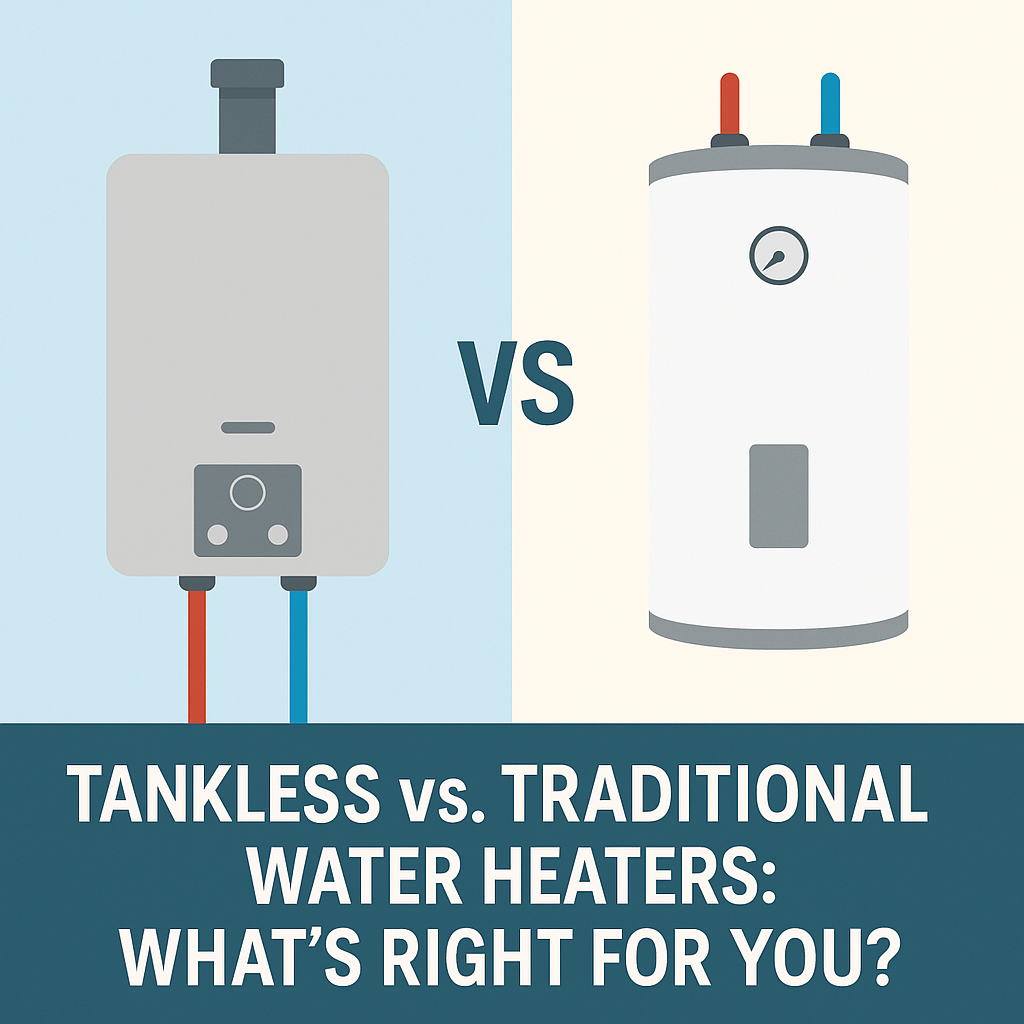

Are you planning on upgrading your home's water heater? Then there's an important decision you'll have to make — traditional, or tankless?
Both water heater varieties have their own benefits, meaning that you'll have to weigh them and decide which is best for your home. Let's take a look at the advantages of tank and tankless water heaters and which one is a better match for you!
The Many Benefits of Tankless Water Heaters
Endless Hot Water on Demand
Tankless water heaters provide continuous hot water whenever needed, making them ideal for long showers or filling a large bathtub. This on-demand system eliminates the wait for a storage tank to refill and reheat. It's perfect for households with high water heating demand, as it allows multiple appliances to use hot water at once.
Compact and Space-Saving Design
These units are wall-mounted, freeing up floor space in tight areas like a small bathroom or basement. Their compact size offers a modern home improvement solution without sacrificing storage. This is especially beneficial for homes where space is at a premium.
Superior Energy Efficiency
A tankless system heats water only when it flows through the pipe, which reduces energy consumption significantly. Unlike traditional heaters that maintain heat in a reservoir 24/7, tankless models operate only as needed. This results in lower electricity or natural gas usage over time!
Lower Risk of Water Damage
Without a storage tank, the risk of leaks is greatly reduced. Moreover, there's less corrosion since there's no constant contact with water, which can help improve the system's longevity.
Environmentally Friendly Operation
Tankless heaters use advanced heat exchanger technology for optimal heat transfer and energy conservation. This reduces your carbon footprint and promotes sustainable fuel consumption. It's an eco-conscious choice for environmentally aware homeowners.
Traditional Water Heater Advantages
Lower Initial Purchase Cost
Traditional storage tank heaters generally cost less upfront, fitting a tight budget. Their simple installation is often less expensive, especially when replacing an old unit. For those prioritizing cost, this option is a more economical alternative.
Simpler Maintenance and Repairs
Technicians and plumbers are more familiar with the components of storage tank systems, making repairs quicker. As a result, issues like sediment buildup or an anode replacement are typically easier to address.
Consistent Hot Water Output
Traditional units store a fixed number of gallons, ready to deliver hot water even during a power outage if powered by gas or oil. The system’s thermostat maintains the desired temperature efficiently.
Works Well with Existing Infrastructure
Most homes are already set up with plumbing and electrical systems suited for tank heaters. Installation usually doesn’t require additional electrical work or valve modifications. It’s a convenient option when upgrading from an older system.
How Can You Choose Between Tank and Tankless Water Heaters?
Evaluate Your Daily Water Usage
Homes with high tap water demand across the kitchen, shower, and washing machine may benefit from a tankless system. Those with lower usage might find a storage tank more suitable. This decision helps balance performance with utility expenses.
Consider Fuel Source Availability
If your home has easy access to natural gas or propane, tankless systems may offer better energy efficiency.
Factor in Space and Location Constraints
Tankless units save room in a basement or small bathroom, while storage tanks require more physical space. If the heater is near the dishwasher or laundry, a tankless system may reduce heat loss. Moreover, spatial layout directly affects system efficiency.
Think About Long-Term Costs and ROI
While tankless units have a higher upfront cost, their extended longevity and reduced energy consumption can lead to long-term savings. Traditional systems may incur more frequent maintenance or heat loss.
Account for Climate and Water Quality
Hard water or extreme temperature swings may affect system performance and longevity. A plumber can help assess the best choice based on corrosion risks, valve performance, and water supply quality. This ensures your chosen system meets environmental and practical demands.
If You Want to Install a New Water Heater, Call 24/7 Plumbing Co.
Whether you believe a tankless or traditional water heater is best for your home, we've got you covered. The plumbers at 24/7 Plumbing Co. install tank and tankless water heaters in Katy so that homeowners like you can have a reliable source of heated water. Reach out today to learn more and speak with our team about an installation!


Schedule Your Residential Plumbing Service in Katy, West Houston, or the Surrounding Communities Today
If you suspect an issue, call us right away for timely, professional, and courteous plumbing services!

.svg)



.svg)



.svg)
.svg)
.svg)